
Essay on a Course of Liberal Education for Civil and Active Life (1765) is an educational treatise by the 18th-century British polymath Joseph Priestley. [1]

Essay on a Course of Liberal Education for Civil and Active Life (1765) is an educational treatise by the 18th-century British polymath Joseph Priestley. [1]
Dedicated to the governing board of Warrington Academy at which Priestley was a tutor, the treatise argues that the education of young people should anticipate their practical needs, something Priestley accused the current universities, Dissenting and Establishment alike, of failing to do. In Priestley's eyes, the contemporary focus on a traditional classical education prevented students from acquiring useful skills. This principle of utility guided his unconventional curricular choices for Warrington's aspiring middle-class businessmen. He proposed that students should study the English language and the modern languages instead of the classical languages, learn practical mathematics, read modern history rather than ancient history, and study the constitution and laws of England. He believed that these topics would prepare his students for the commercial middle-class life that most of them would live; he did not believe that the poor people should receive this same education, arguing "it could be of no service to their country, and often a real detriment to themselves." [2]
The board was convinced and in 1766 Warrington Academy replaced its classical curriculum with Priestley's liberal arts model. [3]
Some scholars of education have argued that this work and Priestley's later Miscellaneous Observations relating to Education (1778) (often reprinted with the Essay on Education) [4] made Priestley the "most considerable English writer on educational philosophy" between the 17th-century John Locke and the 19th-century Herbert Spencer. [5]

The Lunar Society of Birmingham was a British dinner club and informal learned society of prominent figures in the Midlands Enlightenment, including industrialists, natural philosophers and intellectuals, who met regularly between 1765 and 1813 in Birmingham. At first called the Lunar Circle, "Lunar Society" became the formal name by 1775. The name arose because the society would meet during the full moon, as the extra light made the journey home easier and safer in the absence of street lighting. The members cheerfully referred to themselves as "lunaticks", a contemporary spelling of lunatics. Venues included Erasmus Darwin's home in Lichfield, Matthew Boulton's home, Soho House, Bowbridge House in Derbyshire, and Great Barr Hall.
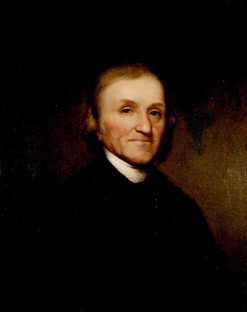
Joseph Priestley was an English chemist, natural philosopher, separatist theologian, grammarian, multi-subject educator, and liberal political theorist. He published over 150 works, and conducted experiments in several areas of science.
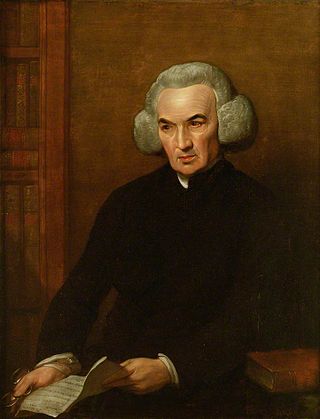
Richard Price was a Welsh moral philosopher, Nonconformist minister and mathematician. He was also a political reformer, pamphleteer, active in radical, republican, and liberal causes such as the French and American Revolutions. He was well-connected and fostered communication between many people, including Thomas Jefferson, John Adams, George Washington, Mirabeau and the Marquis de Condorcet. According to the historian John Davies, Price was "the greatest Welsh thinker of all time".

The Priestley Riots took place from 14 July to 17 July 1791 in Birmingham, England; the rioters' main targets were religious dissenters, most notably the politically and theologically controversial Joseph Priestley. Both local and national issues stirred the passions of the rioters, from disagreements over public library book purchases, to controversies over Dissenters' attempts to gain full civil rights and their support of the French Revolution.

Jacob Bryant (1715–1804) was an English scholar and mythographer, who has been described as "the outstanding figure among the mythagogues who flourished in the late eighteenth and early nineteenth centuries."

Warrington Academy, active as a teaching establishment from 1756 to 1782, was a prominent dissenting academy, that is, a school or college set up by those who dissented from the established Church of England. It was located in Warrington, a town about half-way between the rapidly industrialising Manchester and the burgeoning Atlantic port of Liverpool. Formally dissolved in 1786, the funds then remaining were applied to the founding of Manchester New College in Manchester, which was effectively the Warrington Academy's successor, and in time this led to the formation of Harris Manchester College, Oxford.

Joseph Priestley was a British natural philosopher, Dissenting clergyman, political theorist, and theologian. While his achievements in all of these areas are renowned, he was also dedicated to improving education in Britain; he did this on an individual level and through his support of the Dissenting academies. His grammar textbook was innovative and highly influential. More importantly, though, Priestley introduced a liberal arts curriculum at Warrington Academy, arguing that a practical education would be more useful to students than a classical one. He was also the first to advocate the study and teaching of modern history, an interest driven by his belief that humanity was improving and could bring about Christ's Millennium.

Joseph Priestley was a British natural philosopher, political theorist, clergyman, theologian, and educator. He was one of the most influential Dissenters of the late 18th-century.

The Rudiments of English Grammar (1761) was a popular English grammar textbook written by the 18th-century British polymath Joseph Priestley.

The Institutes of Natural and Revealed Religion, written by 18th-century English Dissenting minister and polymath Joseph Priestley, is a three-volume work designed for religious education published by Joseph Johnson between 1772 and 1774. Its central argument is that revelation and natural law must coincide.

Lectures on History and General Policy (1788) is the published version of a set of lectures on history and government given by the 18th-century British polymath Joseph Priestley to the students of Warrington Academy.

In 1765, 18th-century British polymath Joseph Priestley published A Chart of Biography and its accompanying prose description as a supplement to his Lectures on History and General Policy. Priestley believed that the chart and A New Chart of History (1769) would allow students to "trace out distinctly the dependence of events to distribute them into such periods and divisions as shall lay the whole claim of past transactions in a just and orderly manner."

In 1769, 18th-century British polymath Joseph Priestley published A New Chart of History and its prose explanation as a supplement to his Lectures on History and General Policy. Together with his Chart of Biography (1765), which he dedicated to his friend Benjamin Franklin, Priestley believed these charts would allow students to "trace out distinctly the dependence of events to distribute them into such periods and divisions as shall lay the whole claim of past transactions in a just and orderly manner."

Essay on the First Principles of Government (1768) is an early work of modern liberal political theory by 18th-century British polymath Joseph Priestley.
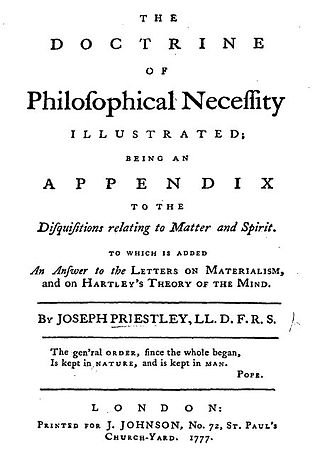
The Doctrine of Philosophical Necessity (1777) is one of the major metaphysical works of 18th-century British polymath Joseph Priestley.
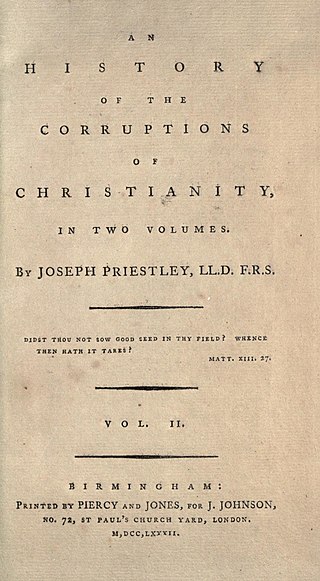
An History of the Corruptions of Christianity, published by Joseph Johnson in 1782, was the fourth part of 18th-century Dissenting minister Joseph Priestley's Institutes of Natural and Revealed Religion (1772–74).

The History and Present State of Electricity (1767), by eighteenth-century British polymath Joseph Priestley, is a survey of the study of electricity up until 1766, as well as a description of experiments by Priestley himself.
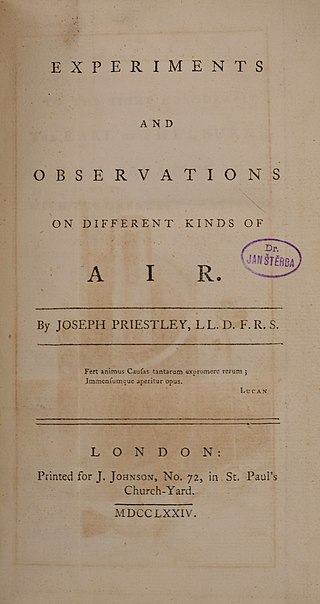
Experiments and Observations on Different Kinds of Air (1774–86) is a six-volume work published by 18th-century British polymath Joseph Priestley which reports a series of his experiments on "airs" or gases, most notably his discovery of the oxygen gas.